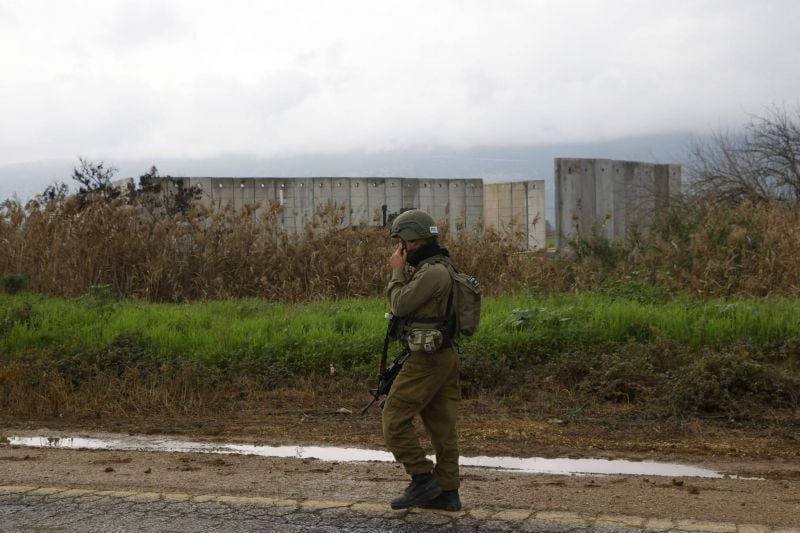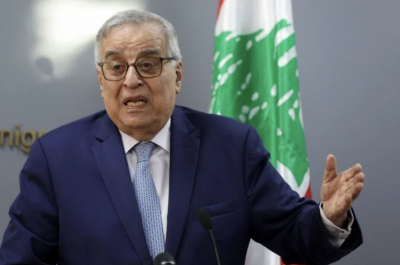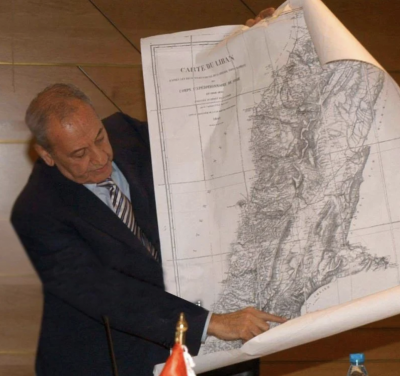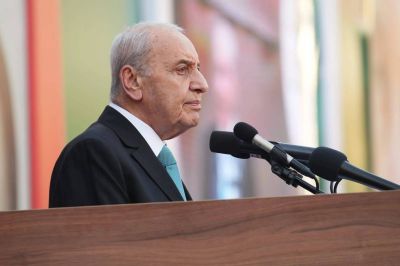
An Israeli soldier walks past a border fence with Lebanon near the northern kibbutz of Kfar Blum after Hezbollah said its fighters carried out an aerial attack with two drones against an Israeli air defense system site in the border area on Jan. 25, 2024, amid continuing battles between Israel and Palestinian Hamas militants in the Gaza Strip. (Credit: Jalaa Marey/AFP)
Lebanon's caretaker foreign minister, Abdallah Bou Habib, said in an interview on Monday with the Emirati broadcaster SkyNews Arabia that the day the land border between Lebanon and Israel is demarcated, Israel will be able to build a border wall there if it so wishes. In another statement made from the Grand Serail, he said that Lebanon currently had "a historic opportunity" to ensure the "permanent" stability of the border.
These statements come at a time when southern Lebanon has been living with Israeli bombardments and Hezbollah retaliation since Oct. 8, 2023, the day after the Hamas attack on Israel, and tensions throughout the Middle East are raising fears of widespread regional escalation.
In a meeting at the Grand Serail, Bou Habib briefed caretaker Prime Minister Najib Mikati on the discussions held at last week's UN Security Council meeting in New York on the situation in the Middle East. On the sidelines, the head of Lebanese diplomacy had held talks with the UN Secretary-General and several of his counterparts.
'Historic opportunity'
From the Grand Serail, Bou Habib called for "the full implementation of resolution 1701" to stabilize the situation in southern Lebanon. "We have a historic opportunity to achieve permanent calm on the southern border. Lebanon does not want war and has never worked towards it," he declared.
Later, in an interview with Sky News Arabia, Bou Habib returned to the resolution, stating that "we will implement 1701 when Israel commits to respecting it." In this context, "we call on Israel to withdraw from Shebaa Farms and Kfar Shouba," he said.
UN Security Council Resolution 1701 put an end to the war between Hezbollah and Israel in 2006. It establishes the sole presence of the Lebanese army and the United Nations Interim Force in Lebanon (UNIFIL) in the south of the country, between the border and the Litani River. This aspect of the text has so far not been respected, as Hezbollah remains heavily deployed south of the Litani.
Hochstein's 'incomplete' ideas
Meanwhile, according to Bou Habib, "Israeli aggression against Lebanon must stop." "It is complicated to put an end to the fighting in southern Lebanon because of continuous Israeli threats," he said, stressing that "if a cease-fire is declared in Gaza, the escalation will stop in southern Lebanon."
According to the minister, the question of border demarcation could be addressed once the situation had calmed down.
To this end, the head of Lebanese foreign policy once again called for "indirect negotiations with Israel" on the points of contention along the land border. In this context, he asserted that the American envoy Amos Hochstein had "passed on some ideas" during his last visit to Beirut, "but they are incomplete." Once the border is demarcated, "Israel will be able to build a wall on the border," he stated.
Since 2012, Israel has built several sections of a concrete wall on the border with Lebanon, the first section having been placed in April of that year near Kfar Kila, opposite the Israeli town of Metula. The wall consists of concrete blocks seven to 10 meters high. Construction work, as well as Israeli operations to build earth embankments or place barbed wire along the border, regularly provoke tensions, particularly at points disputed between the two sides.
This article originally appeared in French in L'Orient-Le Jour.
- The war is expanding, the rules of engagement between Hezbollah and Israel have changed: Jumblatt
- Netanyahu considers a 'redeployment to the North' after the end of the 'intense phase' of the Gaza war: Day 262 of the war on Gaza
- 'The American red light against an Israeli offensive in Lebanon has turned orange'




